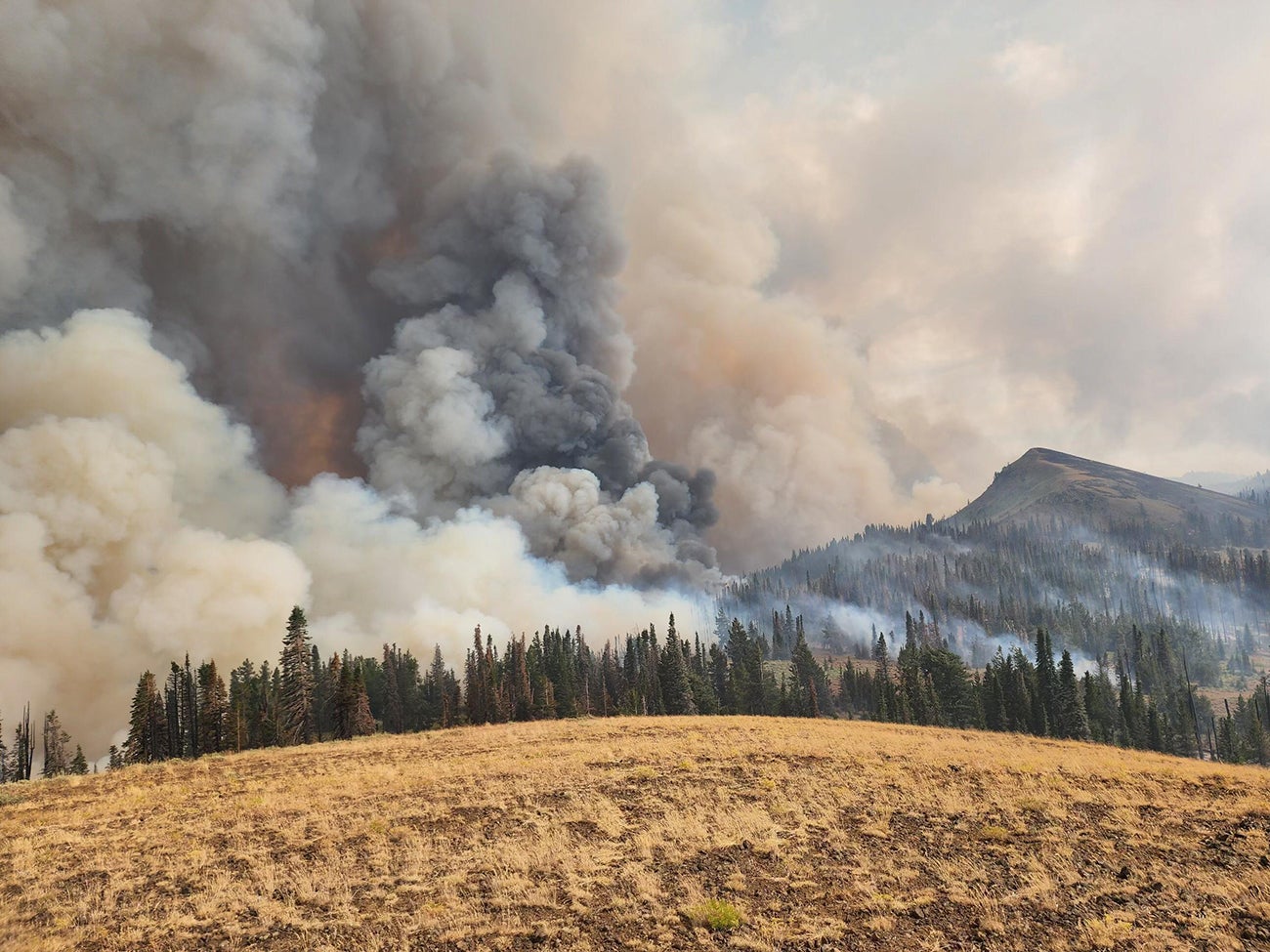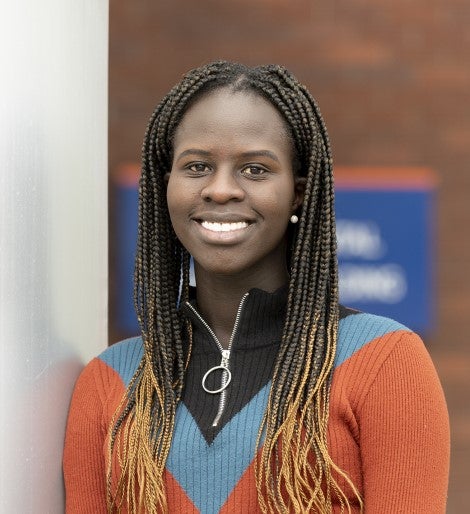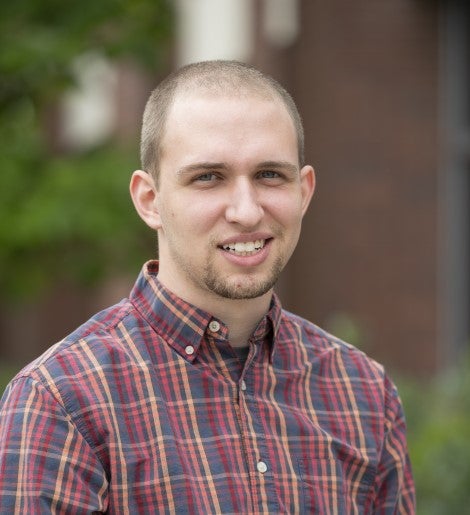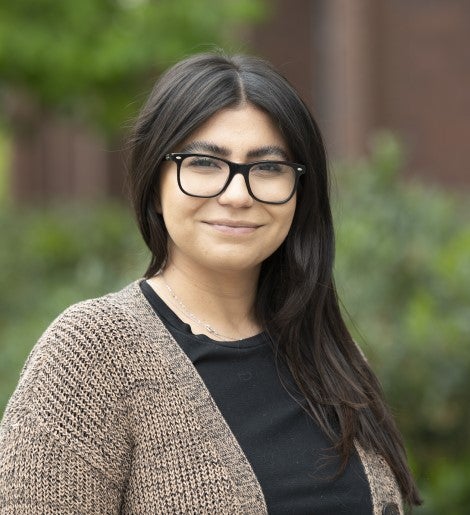
Photo: National Interagency Fire Center
Smoke from wildfires is a toxic chemical-cocktail that can cause damage far beyond watery eyes and coughing. In addition to carbon monoxide, particulate matter and other volatile organic compounds, wildfires that blaze through towns and cities also burn and release substances like lead into the air. Researchers are discovering long-term repercussions from chronic exposure, potentially including neurodegenerative diseases such as Alzheimer’s.
Students in the Translational Health Lab at Boise State are determined to use their research to find community solutions. Second-year biomedical doctoral student Adam Schuller, master of public health student Adhieu Arok, and Bridges to Baccalaureate undergraduate student Julie Mauck all work under the guidance of Assistant Professor Luke Montrose. According to Montrose, this diversity of student experiences advances science.
“Our community partners have provided outstanding experiential learning opportunities to the students and working within this value framework, these students have thrived. My lab is successful as a direct result of the diversity of the students,” Montrose said.
While living in Montana, Montrose, an environmental toxicologist, became interested in studying smoke, especially for high-risk populations, such as tribal families, youth with asthma and elders.
Students in the lab investigate the interaction between environmental exposures (e.g., exercise and air pollution) and the body’s molecular processes in connection with diseases such as Alzheimer’s disease, respiratory conditions and reproductive outcomes.
Luke Montrose has taken a new position at Colorado State University since the publication of this article. We congratulate him on his new role and thank him for his research contributions at Boise State.
Adhieu Arok

As soon as she heard of the Translational Health Lab, Master of Public Health Student Adhieu Arok knew she wanted to be involved.
“When I moved to Boise to start my Master of Public Health, I wanted to get involved in my community,” Arok said. “Professor Montrose came to speak to our class about a new graduate research assistant position that just opened up. Although I had a full-time job and rigorous classes, I was so eager I applied the following day.”
In the lab, and out in the community, Arok researches how the wildfire season affects indoor air quality in skilled nursing facilities in Idaho, and uses surveys and other means to gain an awareness of perceptions and areas for improvement in these spaces. She highlights the importance of poor indoor air quality by implementing educational workshops for administrators and maintenance staff at skilled nursing facilities.
The team provides resources and solutions for the facilities to improve indoor air quality. Some of these improvements include smoke readiness plans, indoor and outdoor air quality monitors, Idaho Power energy audits, installing high efficiency filters, and ordering stand-alone air purification units.
Arok has conducted research since her sophomore year and feels that it is an essential piece of her identity as a scientist. She will take these skills and her passion for healthcare and community into her future goals.
“I want to become an OBGYN and help decrease the maternal and infant mortality rates in the U.S..
My long-term goal is to move back to Africa and live in one of the sub-Saharan countries and work in public health and medicine. I’m hoping to mitigate disparities in maternal and infant mortality rates and also work to improve exposure to poor air quality,” Arok said.
Adam Schuller

Schuller is no stranger to Alzheimer’s. In fact, he remembers his grandfather’s struggle with the disease as a primary influence for going into medicine.
“I started working at a local medical school in a lab studying Alzheimer’s disease and neurodegeneration that was mainly influenced by the passing of my grandfather — he suffered from Alzheimer’s disease — but also just a general curiosity about why the brain becomes dysfunctional, and specifically what can contribute to the loss of our ability to perform executive functions,” Schuller said.
Now that he is pursuing his doctorate in Boise State’s biomolecular science program, Schuller is leveraging previous research experiences to advance the study of how chronic wildfire smoke could be impacting humans.
Specifically, he studies extra-pulmonary side effects of wildfire smoke (that is, effects on organs besides the lungs). Since joining the lab, Schuller published research as lead author on the impacts of wildfire smoke on the sperm and brain in mouse models. Schuller and Montrose discovered that paternal reproductive risks are possible with prolonged exposure to wildfire smoke. When asked how conducting research compared to a more traditional classroom education, Schuller said
“You’re not going to make that discovery by reading existing work and regurgitating it.” Schuller is optimistic that, although wildfire smoke is a rapidly growing concern, research like that being conducted in the Translational Health Lab will make it possible to get the jump on wildfire smoke health issues.
“Wildfire smoke is expected by the year 2050 to contribute the greatest percentage of air pollution in
the United States,” Schuller said. “But we are able to try to get ahead of this phenomena and understand what this changing wildfire landscape means for public health, and how we can try to address this crisis before it becomes the reality for America.”
Julie Mauck

As a Bridges to Baccalaureate student, Julie Mauck began her education at College of Western Idaho before she talked to Boise State lab student Rachel Kessinger. Kessinger told Mauck about the program and the opportunity to conduct research while pursuing her degree at Boise State.
“I am particularly excited to see the resilience and determination of our Bridges to Baccalaureate students at Boise State,” Montrose said. “They have endured pandemic-related setbacks in their research journey but have overcome these challenges through perseverance and adaptability.”
As Mauck learned more about the lab and its study of environmental toxicants and epigenetics, she saw a place where she could advance research around dementia.
“My dad actually had dementia before he died, so I thought that would be a really good contribution on my end, if I could help,” Mauck said.
In her role, Mauck assists Schuller’s research and conducts an ongoing project studying the influence of exercise on Alzheimer’s disease progression and what molecular mechanisms might be at play.
According to Mauck, research has been an integral part of synthesizing and applying what is taught in the classroom to address real community needs. It also fosters the ability to make connections and expand one’s world view and sphere of influence.
“This opportunity has given me a chance to talk to other students about research. There are tons of opportunities out there, you just have to ask. If you have a real interest, then you’ll find a way to get in,” Mauck said.
– By Brianne Phillips
